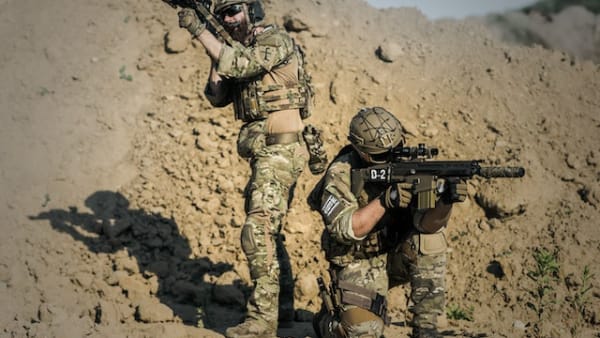The U.S. Army's Warrior Ethos is a set of principles by which every soldier lives. More than a mere set of guidelines, the Warrior Ethos is a way of life that defines what a soldier is and shapes their character, helping to build the resilience, tenacity, and focus necessary to succeed on the battlefield and beyond.
These principles form the backbone of every soldier's training and service, playing a critical role in the U.S. Army's success over the centuries.
The Warrior Ethos consists of four key principles, each of which we will explore in this article:
What is the Warrior Ethos Quote?
The Warrior Ethos is embodied in the Soldier's Creed of the U.S. Army, a part of which states:
"I will always place the mission first. I will never accept defeat. I will never quit. I will never leave a fallen comrade."
What Are The Four Warrior Ethos of the U.S. Army?
#1 "I will always place the mission first."
This ethos emphasizes the importance of duty and selflessness. Regardless of the situation, soldiers are expected to prioritize the mission above their personal needs and desires. It's not about personal glory or achievement; instead, it's about working together as a unit to accomplish the common objective.
This unwavering commitment to duty reflects the sense of responsibility each soldier carries, driving them to complete their mission, no matter how challenging it may be.
#2 "I will never accept defeat."
This second tenet underscores the determination and perseverance ingrained in every soldier. Accepting defeat is not an option in the U.S. Army. This does not mean soldiers are expected to be invincible. Instead, they are trained to confront setbacks, learn from them, and continue striving towards their objective.
This ethos fosters resilience, enabling soldiers to adapt, overcome, and succeed, regardless of the obstacles in their path.
#3 "I will never quit."
Hand-in-hand with the refusal to accept defeat, the ethos of never quitting reinforces the relentless spirit of the U.S. Army. Soldiers understand that giving up can mean the difference between life and death, not only for them but also for their comrades. This principle instills in soldiers a sense of indomitable willpower, compelling them to press on, even under the most extreme conditions.
#4 "I will never leave a fallen comrade."
This final ethos embodies loyalty, teamwork, and the sacred bond between soldiers. It emphasizes that no soldier will be left behind, no matter the cost. This commitment extends beyond the battlefield; it reflects the mutual support, trust, and camaraderie that soldiers offer each other in all aspects of life. It is the guiding principle that fortifies the army as a brotherhood, with soldiers looking out for each other, always.
These four tenets – prioritizing the mission, refusing to accept defeat, committing to persevere, and never leaving a comrade behind – make up the Warrior Ethos that every soldier in the U.S. Army is expected to live by. They do not only apply in combat but also guide soldiers in their everyday lives, instilling a profound sense of duty, resilience, determination, and brotherhood.
The Warrior Ethos, thus, is much more than a creed; it is a shared identity, shaping the U.S. Army's culture and guiding its soldiers in their service to their nation. It is these core principles that create soldiers of the highest caliber, ready to face any challenge, endure any hardship, and stand by their fellow soldiers, forging the U.S. Army into an indomitable force.
Why is the Warrior Ethos important?
The Warrior Ethos is crucial for multiple reasons:
- Unity and Cohesion: By providing a shared set of values, the Ethos fosters unity and cohesion within the ranks, ensuring that every soldier works towards a common goal.
- Resilience and Perseverance: The principles of never accepting defeat and never quitting instill resilience and perseverance in soldiers, equipping them to handle challenges and setbacks effectively.
- Loyalty and Brotherhood: The commitment never to leave a fallen comrade fosters a sense of loyalty and brotherhood among soldiers, cultivating a supportive and dependable environment.
- Discipline and Professionalism: The Ethos encourages discipline and professionalism, enhancing the U.S. Army's efficiency and effectiveness.
How is the Warrior Ethos used?
The Warrior Ethos is not only applicable in combat scenarios but also guides a soldier's behavior and decisions in everyday life:
- Training: During training, the Warrior Ethos guides soldiers, motivating them to persevere through rigorous exercises and develop the resilience needed for the battlefield.
- Combat: In combat, the Warrior Ethos provides a moral compass, guiding soldiers to prioritize their mission, face adversity, and support their comrades.
- Personal Life: The Warrior Ethos extends to a soldier's personal life as well, encouraging them to exhibit selflessness, resilience, perseverance, and loyalty in their interactions and activities.
- Leadership: For those in leadership roles, the Warrior Ethos provides a model for leading by example and instilling these values in the soldiers under their command.
In essence, the Warrior Ethos is more than a set of guidelines - it's a lifestyle that helps shape a soldier's identity, guide their actions, and fortify their character.





